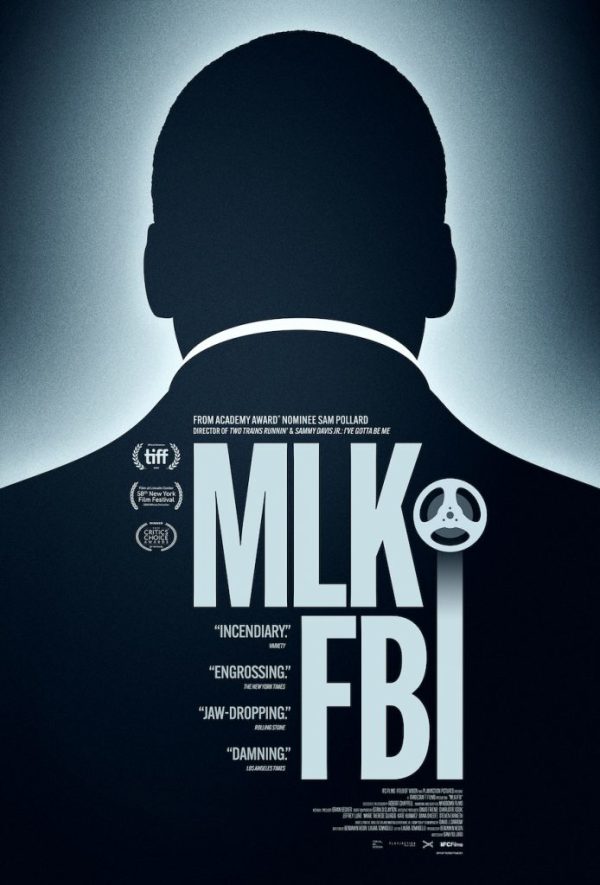MLK/FBI (directed by Sam Pollard, 104 minutes, USA, 2021)
![]() BY DAN TABOR FILM CRITIC In 2019 the FBI released a treasure trove of documents related to the Bureau’s notorious surveillance of Martin Luther King Jr. that began in the wake of the March On Washington in 1963 and persisted until the Civil Rights icon’s assassination in 1968. Director Sam Pollard has sourced these documents for his latest documentary MLK/FBI which doesn’t waste its time with the more salacious accusations, but instead delivers some amazing context and insight into the how and the why this was allowed to go on given King advised both Kennedy and Lyndon B. Johnson on Civil Rights matters. The most refreshing thing I found about this film is how objective Pollard is in his approach to the material and how he details both King’s and J. Edgar Hoover’s motivations in meticulous detail and how that influenced the way this disgraceful chapter in the FBI’s history played out.
BY DAN TABOR FILM CRITIC In 2019 the FBI released a treasure trove of documents related to the Bureau’s notorious surveillance of Martin Luther King Jr. that began in the wake of the March On Washington in 1963 and persisted until the Civil Rights icon’s assassination in 1968. Director Sam Pollard has sourced these documents for his latest documentary MLK/FBI which doesn’t waste its time with the more salacious accusations, but instead delivers some amazing context and insight into the how and the why this was allowed to go on given King advised both Kennedy and Lyndon B. Johnson on Civil Rights matters. The most refreshing thing I found about this film is how objective Pollard is in his approach to the material and how he details both King’s and J. Edgar Hoover’s motivations in meticulous detail and how that influenced the way this disgraceful chapter in the FBI’s history played out.
The most fascinating piece of this story is how Hoover got permission to bug and wiretap MLK in the first place: the Red Scare. Stanley Levison, a close advisor to King, was a card-carrying member of the Communist Party up until 1957, and MLK was warned by both Robert and John Kennedy to steer clear of him given his past political ties and how it could taint his movement. Given current events, Sam Pollard gives a painfully-relevant-to-the-here-and-now history lesson on how Kennedy’s recommendation was partially based on a belief at the time that black people were most susceptible to joining extremist groups. King chose not to abandon his friend and advisor and opened the door for Hoover to begin wiretapping MLK.
Once Hoover discovered King’s infidelity, however, he became obsessed with derailing the Civil Rights movement with this ill-gotten intel. Pollard doesn’t simply demonize Hoover nor idealize King, instead plays devil’s advocate time and time again pointing out that the disconnect between King’s swinging lifestyle and the piety of his meticulously curated public image that drove the conservative Hoover over the edge. While there is enough salacious material about both men to go around, Pollard sticks to the facts that pertain to the story. King is portrayed as a flawed man that did have extra-marital affairs, but it’s ultimately left to the viewer to decide if the sins of the man taint the righteousness of his cause.
The film very effectively brings some much needed context to the most shocking revelation in King’s FBI file: that King allegedly “looked on and laughed” as a pastor he knew raped a woman. Pollard paints the more salacious allegations in these documents as suspect, pointing out that agents were not only encouraged to dig up dirt on King, they were rewarded for it with career advancement and praise from the big boss — the more sordid the bigger the pat on the back from Hoover. Let the record show that the transcripts present only one side of the story, and given that these documents are merely the FBI’s interpretations of events that were overhead on hidden listening devices but rarely eye-witnessed their reliability is somewhat suspect. The duplicity of the Bureau’s actions is only amplified by the fact that actual audio tapes won’t be released till 2027, thereby affording the FBI’s dubious narrative decades to harden into fact decades before the public will have a chance to decide for themselves what’s on those tapes. In stark contrast, MLK/FBI shuns the sensational and the speculative in favor of verifiable facts and evidence-based conclusions. While the more voyeuristic among us may be disappointed that Pollard chose this course, given the uncorroborated yet explosive nature of the FBI’s allegations, it’s clear he took the high road. Would that the FBI had done the same.

